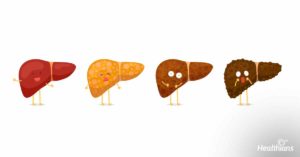Contributed by – Healthians Team
The liver is considered as one of the most important organs of our body. After all, it carries out more than 500 different functions. The liver plays an essential role in helping you digest your food and detoxify your body. Alcohol causes significant harm to the liver and with continuous alcohol abuse, the liver can get damaged beyond repair. Liver diseases caused by excessive consumption of alcohol happens in various stages and each stage only gets progressively worse. Let us discuss how can alcohol damage your liver and how to identify that on time.

Fatty Liver Disease
Fatty liver condition is a condition where excess fat is accumulated in the liver. There are two types of it – Non-Alcoholic Fatty Liver and Alcoholic Fatty Liver. In non-alcoholic fatty liver, there may be inflammation and damage to liver cells along with the accumulation of fat. You are more at risk if you are diabetic, obese, have high blood pressure or suffering from other illnesses. On the other hand, the cause of alcoholic fatty liver is excess consumption of alcohol. The liver produces a chemical called acetaldehyde once it metabolizes the alcohol. Since this chemical is toxic, the liver tries to get rid of it by burning it instead of the fat. And when you drink too much of alcohol, the fat keeps accumulating and the excess acetaldehyde, which the body fails to burn, starts damaging the liver.
This disease is usually silent and hence early identification of it can be difficult. However, some of the symptoms of fatty liver can be:
- Weakness
- Fatigue
- Abdominal pain
- Swelling on your legs
- Web-like clusters of blood vessels under the skin
- Nosebleed
- Loss of appetite
Alcoholic Hepatitis
As you now already know that the chemical produced by the body due to processing alcohol in the liver is highly toxic. And when it is produced excessively and not effectively burnt, it starts damaging the liver cells. This damage of the liver cells causes inflammation of the liver. This condition is called alcoholic hepatitis. Commonly, heavy drinkers are more at risk. But moderate drinkers and teetotallers are also sometimes diagnosed with this condition. Doctors are not entirely sure why this happens but risk factors can be obesity, malnutrition, genetic factors, or other liver disorders. Also, women are more prone to it due to the fact that the female body processes alcohol differently as compared to the male body.
Once you notice the following symptoms, you need to stop the consumption of alcohol immediately as the continuation of it can cause severe damage to the liver.
- Loss of appetite
- Jaundice
- Fever
- Bloating or pain in the abdomen
- Fatigue
- Easy bruising or bleeding
- Nausea

Hepatic Encephalopathy
Severely damaged liver loses its ability to flush out the toxins from the body. This causes a buildup of toxins in the bloodstream which eventually reaches the brain. Consequently, the brain functions get disrupted. One of the biggest reasons for the cause of hepatic encephalopathy is severe liver damage. Moreover, in a severe case of hepatic encephalopathy, a person can become unresponsive and slip into a coma. Hepatic encephalopathy can be permanent when the person doesn’t respond to the treatment or it can be recurrent where treatment can be done to prevent the symptoms.
Symptoms of hepatic encephalopathy can differ depending on the cause of it. However, some of them may include:
- Difficulty thinking
- Personality changes
- Confusion
- Poor judgment
- Forgetfulness
- Anxiety
- Seizures
- Shaky hands
- Confused speech
Liver Cirrhosis
Liver cirrhosis is a condition which happens when the liver becomes lumpy and hard due to the injuries it gets either because of excessive drinking or other liver disorders. Due to this scarring of the liver, blood and other bodily fluids cannot pass through it for filtration. Continued drinking after the fatty liver or alcoholic liver will worsen the scarring. Above all, the advanced stage of cirrhosis can be life-threatening. Liver cirrhosis cannot be undone at any cost. Early identification can certainly help in limiting its damage. Those who are obese or have viral hepatitis are more at risk. Most reported symptoms of liver cirrhosis are:
- Fatigue
- Loss of appetite
- Nausea
- Itchy skin
- Jaundice
- Spiderlike blood vessels on the skin
- Absent or loss of period which is not related to menopause (in women)
- Loss of sex drive (for men)
- Confused speech
- Drowsiness
Liver cancer
Cancer cells from other parts of the body can easily affect the liver since all blood in the body has to pass through it. Other than this, heavy drinkers are prone to primary liver cancer called hepatocellular carcinoma (HCC). Excess scarring of the liver or advanced stage of cirrhosis causes HCC as it can cause a cancerous tumour to develop inside the liver. In addition, you are more at risk of it if you are diabetic, obese or have other serious health conditions that pose risk to the liver. There is certainly no cure for liver cancer. Chemotherapy and radiation may help. Symptoms of liver cancer are similar to those of other liver disorders discussed above. Learning to identify them on time may help in preventing a mishap.




